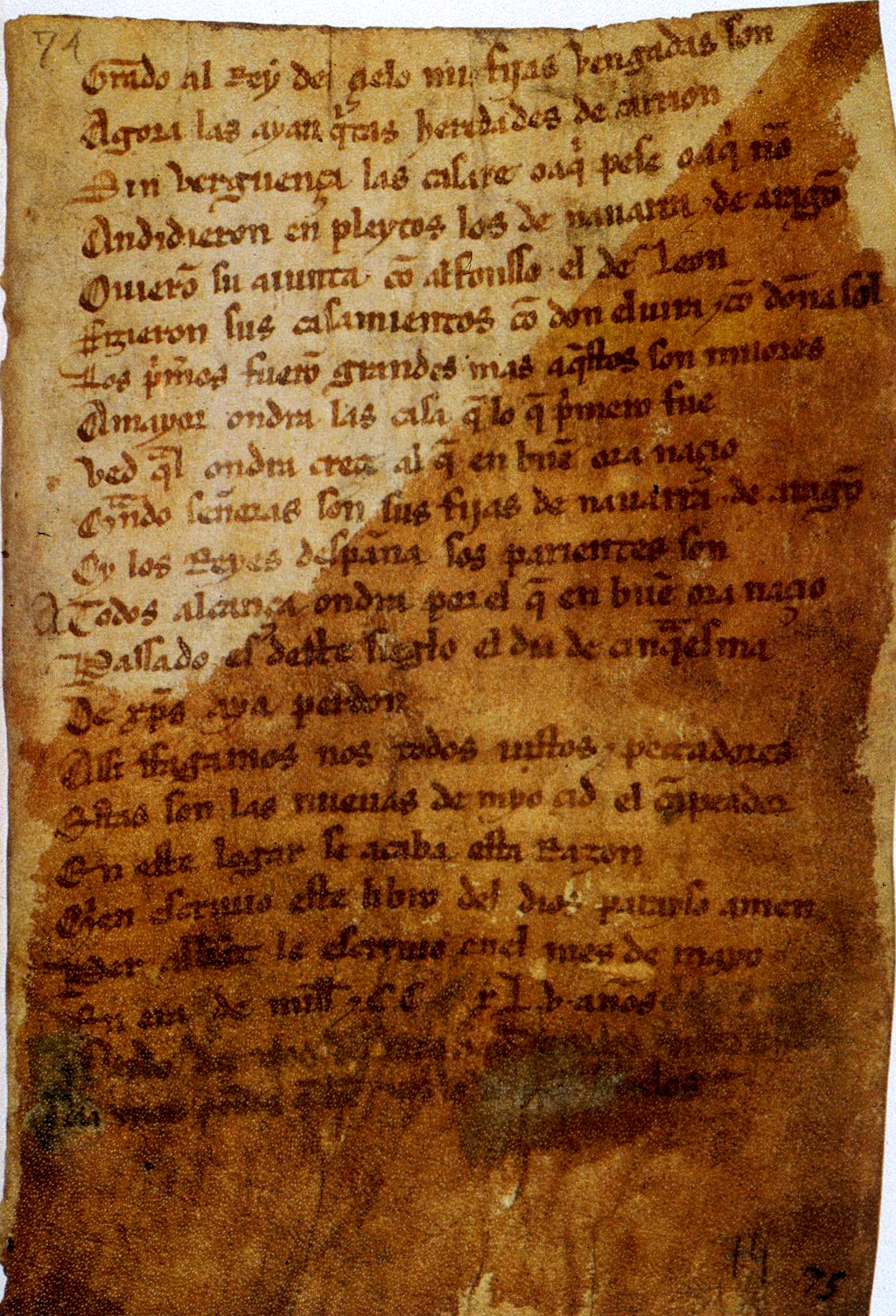Latin Patronimics -ici -is
- Thread starter Przibram
- Start date
These sound as they do since apparently this notary was highly attached to the Latin tradition and wanted to Latinize the names as well as surnames in genitive, which yes, do come from Classical Latin:
Ordofio 1I, durante su gobierno de Galicia, vió levantar en su capital el despues suntuoso y célebre monasterio de San Martin, al que mostró su munificencia en un privilegio (año 912), que debió redactar un notario bastante conservador de la tradicion latina, segun cuidó de ajustar la mayor parte de los patronímicos dentro del molde del genitivo: «Fafila Odorici, Martinus Furtenis, Saracinus Nuñez, Ranimirus Ordonii prolix, Garcia Ordonii prolix, Gudesteo Fernandici, Oduario Guntemirici, Gundesindus Lupelici, Didacus Fradulfici; Sarracinus Nunici, Eduarius Guttierici, Maninus Didaci, Didacus Alvitiz, Fredenanus Guntadi.» Los dos que desafinan (Nuñez y Alvitiz) no hay que atribuirlo á negligencia ó insipiencia de copiante, porque era comun mezclar la forma vulgar con la latina, tal como aparece en una donacion hecha dos años despues por el mismo rey á la iglesia de Mondoñedo: «Rodericus Menendiz, Gundesindus Heroni, Lucidus Vimarani, Gator Menendiz, Arias Menendiz, Sarracinus Muniz, Theodoricus Lucidi, Lotarius Lucidi, Froila Odoariz..»
But the names are of Germanic and other origin and hence sound a bit weird - Rodericus/Rudericus is a medieval Latinized Germanic name which has been Latinized from Roderick.
 en.wiktionary.org
en.wiktionary.org
And Nunicus seems to be Latinized version of a surname "Nuñez".
Ordofio 1I, durante su gobierno de Galicia, vió levantar en su capital el despues suntuoso y célebre monasterio de San Martin, al que mostró su munificencia en un privilegio (año 912), que debió redactar un notario bastante conservador de la tradicion latina, segun cuidó de ajustar la mayor parte de los patronímicos dentro del molde del genitivo: «Fafila Odorici, Martinus Furtenis, Saracinus Nuñez, Ranimirus Ordonii prolix, Garcia Ordonii prolix, Gudesteo Fernandici, Oduario Guntemirici, Gundesindus Lupelici, Didacus Fradulfici; Sarracinus Nunici, Eduarius Guttierici, Maninus Didaci, Didacus Alvitiz, Fredenanus Guntadi.» Los dos que desafinan (Nuñez y Alvitiz) no hay que atribuirlo á negligencia ó insipiencia de copiante, porque era comun mezclar la forma vulgar con la latina, tal como aparece en una donacion hecha dos años despues por el mismo rey á la iglesia de Mondoñedo: «Rodericus Menendiz, Gundesindus Heroni, Lucidus Vimarani, Gator Menendiz, Arias Menendiz, Sarracinus Muniz, Theodoricus Lucidi, Lotarius Lucidi, Froila Odoariz..»
But the names are of Germanic and other origin and hence sound a bit weird - Rodericus/Rudericus is a medieval Latinized Germanic name which has been Latinized from Roderick.
Rodericus - Wiktionary, the free dictionary
 en.wiktionary.org
en.wiktionary.org
And Nunicus seems to be Latinized version of a surname "Nuñez".
Last edited:
I think they're more likely to be formed from the Latin -ici:Thank you very much. I see in the second donation for instance the sufixes -iz and -i, but can they be derived from Latin -is, which is a feminine suffix?
- Perhaps the originally patronymic surname suffixes in -z (as in Díaz, Pérez, López, Ruiz, Muñoz, etc.) is from numerous Latinized Gothic genitives in -īcī, from original -iks. Thus, Roderic(us) (→ Ruy) → Roderīcī 'son of Roderick' → Rodriz → Ruiz.

Influences on the Spanish language - Wikipedia
 en.wikipedia.org
en.wikipedia.org
Following the Visigothic invasion of the Iberian peninsula, the local population adopted to a large extent a patronymic naming system: the suffix -icī (a Latin genitive meaning son of) would be attached to the name of a man's father.[24][25] This suffix gradually evolved into different local forms, depending on the language. For example, the son of Fernando would be called:
- Basque: Fernanditz[26]
- Castellan: Fernández
- Catalan: Ferrandis
- Portuguese and Galician: Fernandes
Spanish naming customs - Wikipedia
 en.wikipedia.org
en.wikipedia.org
